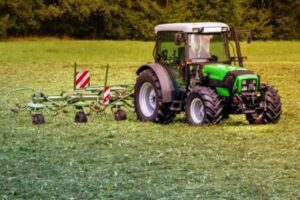Last updated on July 28, 2025
For Nigeria to secure its future prosperity, its agricultural sector must transform. The challenges are immense—from climate change and low yields to broken supply chains—but the opportunities for innovation-driven growth are even greater. The key to unlocking this potential lies in the strategic adoption of agricultural technology, or agritech.
This guide is not for the farmer in the field, but for the policymakers, investors, development partners, and students who will shape that transformation. It moves beyond listing specific gadgets to outline the core challenges as areas for intervention, the key technological levers for growth, and the critical role that policy and investment must play. This is a strategic roadmap to building a resilient, food-secure, and economically vibrant Nigeria.
Executive Summary / Key Takeaways
- Strategic Imperative: Nigeria’s food security and economic prosperity are directly linked to the rapid and strategic adoption of agritech.
- Targeted Interventions: Key challenges like low yields, high post-harvest losses, and climate vulnerability are ripe for technology-driven solutions.
- Policy as Enabler: Government must create an enabling environment through infrastructure investment, financial incentives, clear regulations, and land tenure reform.
- Diverse Investment Opportunities: Significant returns lie in agritech platforms, “Tech-as-a-Service” models, cold chain logistics, and local manufacturing.
- Collaborative Ecosystem: Success hinges on robust Public-Private Partnerships involving government, private sector, research institutions, and farmers.
Understanding the Core Challenges: Areas for Intervention & Investment
To effectively deploy capital and policy, we must first have a clear-eyed view of the problems that need solving. Nigeria’s agricultural sector, for all its potential, is constrained by several deep-seated issues ripe for technological disruption.





Why Are Yields So Low and Food Insecurity So High?
As Africa’s most populous nation with a booming population, Nigeria’s farms often produce far less per hectare than global benchmarks. This productivity gap stems from a heavy reliance on traditional, labor-intensive methods, a lack of access to improved seeds, and inefficient land use. The consequence is not just a pinch on farmer incomes; it is a direct threat to national food security, making basic staples expensive and scarce for millions of families. A farmer using traditional hand tools, no matter how dedicated, simply cannot keep pace with modern demands. This represents a clear area for intervention through mechanization and data-driven farming practices.
Why Do We Lose So Much Produce After Harvest?
It is an economic and social tragedy that up to 40-50% of perishable produce spoils before it ever reaches the market, according to FAO reports. This monumental waste is a direct result of inadequate storage facilities, inefficient transportation networks, and disorganized supply chains. Every spoiled tomato represents lost income for a farmer, wasted natural resources, and food that could have fed a family. This points to a critical investment opportunity in cold chain logistics, supply chain management software, and platforms that create more direct and efficient routes to market.
How Is Climate Change Impacting Our Farms?
Nigerian farmers are on the bleeding edge of climate change. Erratic rainfall, prolonged droughts, and devastating floods create a constant state of unpredictability and risk. This is compounded by soil degradation from outdated farming practices and inefficient water management. Building resilience against these climate shocks is not optional; it is paramount for survival. This necessitates policy support and investment in climate-smart technologies like drought-resistant crops and precision irrigation. As Dr. Olumide Ojo, an agricultural climate expert at the African Development Bank, recently highlighted, “Climate change is not a distant threat for Nigerian agriculture; it’s a present reality demanding immediate, technology-driven adaptation strategies.” (Source: AfDB Climate Dialogue)
Why Are the Information, Finance, and Market Gaps So Persistent?
The majority of Nigerian farmers, particularly smallholders, operate in a vacuum. They often lack access to timely weather forecasts, current market prices, or best-practice farming advice. This “information gap” leads to guesswork and high risk. Furthermore, a lack of access to formal credit prevents investment in better inputs, while exploitative middlemen often capture a disproportionate share of profits. This traps farmers in a cycle of subsistence. Breaking this cycle requires a strategic focus on digital platforms that deliver information, financial services, and fair market access directly to the farmer.




Key Levers for Transformation
Instead of focusing on individual products, a strategic approach involves understanding the broad categories of technology that can address Nigeria’s core challenges. For a general overview of these technologies, refer to our Ultimate Guide to Agritech in Nigeria.
- Data-Driven Decision Making (Precision Agriculture): This is the foundational shift from farming by tradition to farming by information. This lever includes IoT sensors, drones, and satellite imagery that collect data on soil health, water levels, and crop growth. This data is then analyzed by AI and software to provide precise recommendations. Strategic Importance: It de-risks farming, optimizes the use of expensive inputs like fertilizer and water, and dramatically improves resource efficiency. For more on sensors, see What Sensors Are Used in Smart Irrigation Systems?. For AI integration, check How to Integrate AI Into My Existing Farm Management System.
- Automation and Mechanization: This lever encompasses everything from modern planting and harvesting equipment to advanced robotics and autonomous tractors. Strategic Importance: It directly addresses the issues of low productivity and labor shortages, enabling farmers to cultivate larger areas more efficiently and consistently, which is essential for meeting national food demand. Dive deeper into the hardware with A Farmer’s Guide to Agricultural Robotics and Automation Hardware and learn how to automate your farm with How to Automate Your Farm with Agritech Tools.
- Biotechnology and Crop Resilience: This involves developing improved crop varieties through conventional breeding and genetic engineering. This includes “climate-smart” crops that are resistant to drought, local pests, and diseases. Strategic Importance: This is about future-proofing Nigeria’s food supply. It builds resilience directly into the “hardware” of farming—the crops themselves—ensuring greater stability in the face of climate change and reducing reliance on chemical inputs.
- Digital Platforms and Market Linkages: This lever includes the mobile apps, online marketplaces, and fintech solutions that connect farmers to the wider economy. Strategic Importance: These platforms are critical for formalizing the agricultural sector. They solve the information and access gaps, providing farmers with market intelligence, direct connections to buyers, and access to digital financial services, thereby creating more efficient and equitable value chains. For detailed insights, see Cloud-Based Farming Tools.
The Role of Public Policy in Fostering Innovation
The private sector can drive innovation, but only the government can create the enabling environment for it to flourish at scale. The following policy areas are critical:
- Investment in Foundational Infrastructure: Technology cannot function without power and connectivity. Prioritizing the expansion of reliable internet and electricity to rural areas is the single most important enabler of agritech adoption. As Professor Ndubuisi Ekekwe, a Nigerian tech thought leader, often states, “You cannot build a digital economy on analogue infrastructure. Our rural areas need consistent power and broadband to truly leverage agritech.” (Source: Tekedia Institute Insights)
- Creation of Financial Incentives: Government can de-risk investment for both farmers and startups through targeted subsidies for technology adoption, tax breaks for agritech companies, and the creation of grant programs and innovation funds.
- Establishment of Clear Regulatory Frameworks: Investors and innovators need regulatory certainty. This means establishing clear and efficient guidelines for areas like drone operation, the approval of biotech crops (GMOs), and data privacy and ownership.
- Strengthening of Land Tenure Systems: Farmers and investors are hesitant to make long-term capital investments in land they do not formally own or have secure title to. Reforming land tenure policies to provide greater security is essential for encouraging investment in fixed assets like irrigation systems.
Identifying Key Investment Opportunities
For private investors and development funds, Nigeria’s agritech sector presents significant opportunities to generate both financial returns and social impact.
- Agritech Platforms: Investing in local startups that are building mobile-first solutions for market access, fintech, and advisory services. These platforms are highly scalable and address a direct need.
- “Tech-as-a-Service” Models: The high upfront cost of hardware is a major barrier. Investment in companies that offer rental or “pay-per-use” services for drones, tractors, or cold storage is a highly attractive model. It makes technology accessible to a much broader market.
- Supply Chain and Cold Chain Logistics: Investing in the “middle” of the value chain—warehousing, cold storage, and logistics—tackles the massive post-harvest loss problem and offers substantial returns. Adaeze Ebo, a Partner at Sahel Consulting Agriculture & Nutrition Ltd., emphasizes this, stating, “Addressing post-harvest losses through strategic investments in cold chain and logistics is arguably the fastest way to impact food security and farmer profitability in Nigeria.” (Source: Sahel Consulting Public Statements)
- Local Assembly and Manufacturing: Supporting ventures that can locally assemble or manufacture components like sensors or drone parts can drastically reduce costs, create local jobs, and build a more resilient domestic supply chain.
Building a Collaborative Ecosystem: The Power of Public-Private Partnerships
No single entity can solve Nigeria’s agricultural challenges. Lasting transformation requires a robust ecosystem built on Public-Private Partnerships (PPPs).



- Government sets the policy, provides foundational infrastructure, and de-risks investment.
- The Private Sector drives innovation, commercializes solutions, and builds efficient distribution networks.
- Research Institutions & Universities conduct the R&D needed to develop locally adapted technologies, like new seed varieties.
- Farmers & Cooperatives provide the essential on-the-ground feedback to ensure solutions are practical, effective, and user-friendly.
A successful partnership might see the government fund university research into a new drought-resistant seed, which is then licensed to a private agritech company that uses its mobile platform and agent network to distribute it to farmers, with training support from modernized public extension services. As Dr. Ngozi Okonjo-Iweala, Director-General of the World Trade Organization and former Nigerian Finance Minister, once noted, “To move agriculture from subsistence to sustainable growth requires a partnership of government, the private sector, and research. No single player can do it alone.” (Source: WTO Public Remarks)
Overcoming Barriers to Adoption
While the potential is immense, stakeholders must be realistic about the hurdles.
- Infrastructure Gaps: The lack of reliable internet and power in rural areas remains the most significant barrier and must be a top priority for public investment.
- Digital Literacy: Training programs are essential. These must be culturally sensitive, delivered in local languages, and leverage peer-to-peer learning models to be effective at scale.
- Affordability: Innovative financing models—micro-loans, cooperative purchasing, rental services—are needed to make technology accessible beyond the wealthiest farmers.
- Localization: A “one-size-fits-all” approach will fail in Nigeria’s diverse agro-ecological landscape. Solutions must be adapted to local conditions, crops, and customs.
Frequently Asked Questions (FAQs)
What is agritech from a policy perspective?
Agritech, in policy, refers to the strategic integration of technology (like AI, IoT, robotics) into agriculture to address food security, improve productivity, and drive economic growth through targeted interventions.
Why is government intervention crucial for agritech adoption?
Government intervention is vital to create an enabling environment through infrastructure development, financial incentives, clear regulatory frameworks, and land tenure reforms, de-risking the sector for private investment.





What are “Tech-as-a-Service” (TaaS) models in agritech?
TaaS models allow farmers or businesses to access expensive agricultural machinery or technology on a rental or pay-per-use basis, significantly lowering the upfront cost and making innovation more accessible.
What are the primary investment opportunities in Nigerian agritech?
Key opportunities include agritech platforms (market access, fintech), TaaS models for hardware, cold chain logistics, and local assembly/manufacturing of agricultural technology components.
How do Public-Private Partnerships (PPPs) accelerate agritech growth?
PPPs combine government policy and infrastructure support with private sector innovation and investment, along with research institutions and farmer feedback, to build a robust and sustainable agritech ecosystem.
What is the biggest barrier to agritech adoption in Nigeria for policymakers to address?
The most significant barrier is the lack of foundational infrastructure, particularly reliable internet connectivity and electricity, in rural farming communities.




How does land tenure security impact agritech investment?
Secure land tenure encourages long-term investments in fixed agricultural assets and technologies, as farmers and investors are confident in their ownership and ability to benefit from improvements.
Conclusion: A Strategic Imperative for a Food-Secure Nigeria
The journey to a technologically advanced and food-secure Nigeria is a strategic imperative. By understanding the core challenges as opportunities for intervention and by deploying smart policy and targeted investment, we can create an ecosystem where innovation thrives. This is about more than just boosting GDP; it is about building a resilient nation that can feed itself, create economic opportunities for millions, and compete on the global stage.
For a practical look at the specific tools and technologies available to farmers, we invite you to read our comprehensive Ultimate Guide to Agritech in Nigeria.







